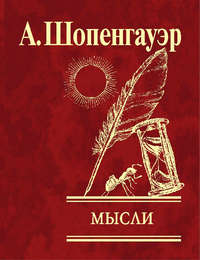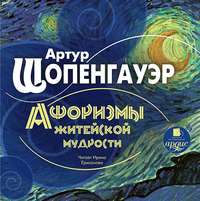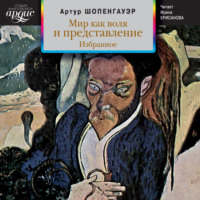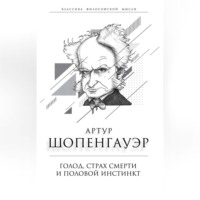 полная версия
полная версияThe World as Will and Idea (Vol. 2 of 3)
If, as so often happens, metaphysics is reproached with having made so little progress, it ought also to be considered that no other science has grown up like it under constant oppression, none has been so hampered and hindered from without as it has always been by the religion of every land, which, everywhere in possession of a monopoly of metaphysical knowledge, regards metaphysics as a weed growing beside it, as an unlicensed worker, as a horde of gipsies, and as a rule tolerates it only under the condition that it accommodates itself to serve and follow it. For where has there ever been true freedom of thought? It has been vaunted sufficiently; but whenever it wishes to go further than perhaps to differ about the subordinate dogmas of the religion of the country, a holy shudder seizes the prophets of tolerance, and they say: “Not a step further!” What progress of metaphysics was possible under such oppression? Nay, this constraint which the privileged metaphysics exercises is not confined to the communication of thoughts, but extends to thinking itself, for its dogmas are so firmly imprinted in the tender, plastic, trustful, and thoughtless age of childhood, with studied solemnity and serious airs, that from that time forward they grow with the brain, and almost assume the nature of innate thoughts, which some philosophers have therefore really held them to be, and still more have pretended to do so. Yet nothing can so firmly resist the comprehension of even the problem of metaphysics as a previous solution of it intruded upon and early implanted in the mind. For the necessary starting-point for all genuine philosophy is the deep feeling of the Socratic: “This one thing I know, that I know nothing.” The ancients were in this respect in a better position than we are, for their national religions certainly limited somewhat the imparting of thoughts; but they did not interfere with the freedom of thought itself, because they were not formally and solemnly impressed upon children, and in general were not taken so seriously. Therefore in metaphysics the ancients are still our teachers.
Whenever metaphysics is reproached with its small progress, and with not having yet reached its goal in spite of such sustained efforts, one ought further to consider that in the meanwhile it has constantly performed the invaluable service of limiting the boundless claims of the privileged metaphysics, and yet at the same time combating naturalism and materialism proper, which are called forth by it as an inevitable reaction. Consider to what a pitch the arrogance of the priesthood of every religion would rise if the belief in their doctrines was as firm and blind as they really wish. Look back also at the wars, disturbances, rebellions, and revolutions in Europe from the eighth to the eighteenth century; how few will be found that have not had as their essence, or their pretext, some controversy about beliefs, thus a metaphysical problem, which became the occasion of exciting nations against each other. Yet is that whole thousand years a continual slaughter, now on the battlefield, now on the scaffold, now in the streets, in metaphysical interests! I wish I had an authentic list of all crimes which Christianity has really prevented, and all good deeds it has really performed, that I might be able to place them in the other scale of the balance.
Lastly, as regards the obligations of metaphysics, it has only one; for it is one which endures no other beside it – the obligation to be true. If one would impose other obligations upon it besides this, such as to be spiritualistic, optimistic, monotheistic, or even only to be moral, one cannot know beforehand whether this would not interfere with the fulfilment of that first obligation, without which all its other achievements must clearly be worthless. A given philosophy has accordingly no other standard of its value than that of truth. For the rest, philosophy is essentially world-wisdom: its problem is the world. It has to do with this alone, and leaves the gods in peace – expects, however, in return, to be left in peace by them.
Supplements to the Second Book
Chapter XVIII.29 On The Possibility Of Knowing The Thing In Itself
In 1836 I already published, under the title “Ueber den Willen in der Natur” (second ed., 1854; third ed., 1867), the most essential supplement to this book, which contains the most peculiar and important step in my philosophy, the transition from the phenomenon to the thing in itself, which Kant gave up as impossible. It would be a great mistake to regard the foreign conclusions with which I have there connected my expositions as the real material and subject of that work, which, though small as regards its extent, is of weighty import. These conclusions are rather the mere occasion starting from which I have there expounded that fundamental truth of my philosophy with so much greater clearness than anywhere else, and brought it down to the empirical knowledge of nature. And indeed this is done most exhaustively and stringently under the heading “Physische Astronomie;” so that I dare not hope ever to find a more correct or accurate expression of that core of my philosophy than is given there. Whoever desires to know my philosophy thoroughly and to test it seriously must therefore give attention before everything to that section. Thus, in general, all that is said in that little work would form the chief content of these supplements, if it had not to be excluded on account of having preceded them; but, on the other hand, I here take for granted that it is known, for otherwise the very best would be wanting.
I wish now first of all to make a few preliminary observations from a general point of view as to the sense in which we can speak of a knowledge of the thing in itself and of its necessary limitation.
What is knowledge? It is primarily and essentially idea. What is idea? A very complicated physiological process in the brain of an animal, the result of which is the consciousness of a picture there. Clearly the relation between such a picture and something entirely different from the animal in whose brain it exists can only be a very indirect one. This is perhaps the simplest and most comprehensible way of disclosing the deep gulf between the ideal and the real. This belongs to the things of which, like the motion of the earth, we are not directly conscious; therefore the ancients did not observe it, just as they did not observe the motion of the earth. Once pointed out, on the other hand, first by Descartes, it has ever since given philosophers no rest. But after Kant had at last proved in the most thorough manner the complete diversity of the ideal and the real, it was an attempt, as bold as it was absurd, yet perfectly correctly calculated with reference to the philosophical public in Germany, and consequently crowned with brilliant results, to try to assert the absolute identity of the two by dogmatic utterances, on the strength of a pretended intellectual intuition. In truth, on the contrary, a subjective and an objective existence, a being for self and a being for others, a consciousness of one's own self, and a consciousness of other things, is given us directly, and the two are given in such a fundamentally different manner that no other difference can compare with this. About himself every one knows directly, about all others only very indirectly. This is the fact and the problem.
Whether, on the other hand, through further processes in the interior of a brain, general conceptions (Universalia) are abstracted from the perceptible ideas or images that have arisen within it, for the assistance of further combinations, whereby knowledge becomes rational, and is now called thinking– this is here no longer the essential question, but is of subordinate significance. For all such conceptions receive their content only from the perceptible idea, which is therefore primary knowledge, and has consequently alone to be taken account of in an investigation of the relation between the ideal and the real. It therefore shows entire ignorance of the problem, or at least it is very inept, to wish to define that relation as that between being and thinking. Thinking has primarily only a relation to perceiving, but perception has a relation to the real being of what is perceived, and this last is the great problem with which we are here concerned. Empirical being, on the other hand, as it lies before us, is nothing else than simply being given in perception; but the relation of the latter to thinking is no riddle, for the conceptions, thus the immediate materials of thought, are obviously abstracted from perception, which no reasonable man can doubt. It may be said in passing that one can see how important the choice of expressions in philosophy is from the fact that that inept expression condemned above, and the misunderstanding which arose from it, became the foundation of the whole Hegelian pseudo-philosophy, which has occupied the German public for twenty-five years.
If, however, it should be said: “The perception is itself the knowledge of the thing in itself: for it is the effect of that which is outside of us, and as this acts, so it is: its action is just its being;” to this we reply: (1.) that the law of causality, as has been sufficiently proved, is of subjective origin, as well as the sensation from which the perception arises; (2.) that at any rate time and space, in which the object presents itself, are of subjective origin; (3.) that if the being of the object consists simply in its action, this means that it consists merely in the changes which it brings about in others; therefore itself and in itself it is nothing at all. Only of matter is it true, as I have said in the text, and worked out in the essay on the principle of sufficient reason, at the end of § 21, that its being consists in its action, that it is through and through only causality, thus is itself causality objectively regarded; hence, however, it is also nothing in itself (ἡ ὑλη το αληθινον ψευδος, materia mendacium verax), but as an ingredient in the perceived object, is a mere abstraction, which for itself alone can be given in no experience. It will be fully considered later on in a chapter of its own. But the perceived object must be something in itself, and not merely something for others. For otherwise it would be altogether merely idea, and we would have an absolute idealism, which would ultimately become theoretical egoism, with which all reality disappears and the world becomes a mere subjective phantasm. If, however, without further question, we stop altogether at the world as idea, then certainly it is all one whether I explain objects as ideas in my head or as phenomena exhibiting themselves in time and space; for time and space themselves exist only in my head. In this sense, then, an identity of the ideal and the real might always be affirmed; only, after Kant, this would not be saying anything new. Besides this, however, the nature of things and of the phenomenal world would clearly not be thereby exhausted; but with it we would always remain still upon the ideal side. The real side must be something toto genere different from the world as idea, it must be that which things are in themselves; and it is this entire diversity between the ideal and the real which Kant has proved in the most thorough manner.
Locke had denied to the senses the knowledge of things as they are in themselves; but Kant denied this also to the perceiving understanding, under which name I here comprehend what he calls the pure sensibility, and, as it is given a priori, the law of causality which brings about the empirical perception. Not only are both right, but we can also see quite directly that a contradiction lies in the assertion that a thing is known as it is in and for itself, i. e., outside of knowledge. For all knowing is, as we have said, essentially a perceiving of ideas; but my perception of ideas, just because it is mine, can never be identical with the inner nature of the thing outside of me. The being in and for itself, of everything, must necessarily be subjective; in the idea of another, however, it exists just as necessarily as objective– a difference which can never be fully reconciled. For by it the whole nature of its existence is fundamentally changed; as objective it presupposes a foreign subject, as whose idea it exists, and, moreover, as Kant has shown, has entered forms which are foreign to its own nature, just because they belong to that foreign subject, whose knowledge is only possible by means of them. If I, absorbed in this reflection, perceive, let us say lifeless bodies, of easily surveyed magnitude and regular, comprehensible form, and now attempt to conceive this spatial existence, in its three dimensions, as their being in itself, consequently as the existence which to the things is subjective, the impossibility of the thing is at once apparent to me, for I can never think those objective forms as the being which to the things is subjective, rather I become directly conscious that what I there perceive is only a picture produced in my brain, and existing only for me as the knowing subject, which cannot constitute the ultimate, and therefore subjective, being in and for itself of even these lifeless bodies. But, on the other hand, I must not assume that even these lifeless bodies exist only in my idea, but, since they have inscrutable qualities, and, by virtue of these, activity, I must concede to them a being in itself of some kind. But this very inscrutableness of the properties, while, on the one hand, it certainly points to something which exists independently of our knowledge, gives also, on the other hand, the empirical proof that our knowledge, because it consists simply in framing ideas by means of subjective forms, affords us always mere phenomena, not the true being of things. This is the explanation of the fact that in all that we know there remains hidden from us a certain something, as quite inscrutable, and we are obliged to confess that we cannot thoroughly understand even the commonest and simplest phenomena. For it is not merely the highest productions of nature, living creatures, or the complicated phenomena of the unorganised world that remain inscrutable to us, but even every rock-crystal, every iron-pyrite, by reason of its crystallographical, optical, chemical, and electrical properties, is to the searching consideration and investigation an abyss of incomprehensibilities and mysteries. This could not be the case if we knew things as they are in themselves; for then at least the simpler phenomena, the path to whose qualities was not barred for us by ignorance, would necessarily be thoroughly comprehensible to us, and their whole being and nature would be able to pass over into our knowledge. Thus it lies not in the defectiveness of our acquaintance with things, but in the nature of knowledge itself. For if our perception, and consequently the whole empirical comprehension of the things that present themselves to us, is already essentially and in the main determined by our faculty of knowledge, and conditioned by its forms and functions, it cannot but be that things exhibit themselves in a manner which is quite different from their own inner nature, and therefore appear as in a mask, which allows us merely to assume what is concealed beneath it, but never to know it; hence, then, it gleams through as an inscrutable mystery, and never can the nature of anything entire and without reserve pass over into knowledge; but much less can any real thing be construed a priori, like a mathematical problem. Thus the empirical inscrutableness of all natural things is a proof a posteriori of the ideality and merely phenomenal-actuality of their empirical existence.
According to all this, upon the path of objective knowledge, hence starting from the idea, one will never get beyond the idea, i. e., the phenomenon. One will thus remain at the outside of things, and will never be able to penetrate to their inner nature and investigate what they are in themselves, i. e., for themselves. So far I agree with Kant. But, as the counterpart of this truth, I have given prominence to this other truth, that we are not merely the knowing subject, but, in another aspect, we ourselves also belong to the inner nature that is to be known, we ourselves are the thing in itself; that therefore a way from within stands open for us to that inner nature belonging to things themselves, to which we cannot penetrate from without, as it were a subterranean passage, a secret alliance, which, as if by treachery, places us at once within the fortress which it was impossible to take by assault from without. The thing in itself can, as such, only come into consciousness quite directly, in this way, that it is itself conscious of itself: to wish to know it objectively is to desire something contradictory. Everything objective is idea, therefore appearance, mere phenomenon of the brain.
Kant's chief result may in substance be thus concisely stated: “All conceptions which have not at their foundation a perception in space and time (sensuous intuition), that is to say then, which have not been drawn from such a perception, are absolutely empty, i. e., give no knowledge. But since now perception can afford us only phenomena, not things in themselves, we have also absolutely no knowledge of things in themselves.” I grant this of everything, with the single exception of the knowledge which each of us has of his own willing: this is neither a perception (for all perception is spatial) nor is it empty; rather it is more real than any other. Further, it is not a priori, like merely formal knowledge, but entirely a posteriori; hence also we cannot anticipate it in the particular case, but are hereby often convicted of error concerning ourselves. In fact, our willing is the one opportunity which we have of understanding from within any event which exhibits itself without, consequently the one thing which is known to us immediately, and not, like all the rest, merely given in the idea. Here, then, lies the datum which alone is able to become the key to everything else, or, as I have said, the single narrow door to the truth. Accordingly we must learn to understand nature from ourselves, not conversely ourselves from nature. What is known to us immediately must give us the explanation of what we only know indirectly, not conversely. Do we perhaps understand the rolling of a ball when it has received an impulse more thoroughly than our movement when we feel a motive? Many may imagine so, but I say it is the reverse. Yet we shall attain to the knowledge that what is essential in both the occurrences just mentioned is identical; although identical in the same way as the lowest audible note of harmony is the same as the note of the same name ten octaves higher.
Meanwhile it should be carefully observed, and I have always kept it in mind, that even the inward experience which we have of our own will by no means affords us an exhaustive and adequate knowledge of the thing in itself. This would be the case if it were entirely an immediate experience; but it is effected in this way: the will, with and by means of the corporisation, provides itself also with an intellect (for the sake of its relations to the external world), and through this now knows itself as will in self-consciousness (the necessary counterpart of the external world); this knowledge therefore of the thing in itself is not fully adequate. First of all, it is bound to the form of the idea, it is apprehension, and as such falls asunder into subject and object. For even in self-consciousness the I is not absolutely simple, but consists of a knower, the intellect, and a known, the will. The former is not known, and the latter does not know, though both unite in the consciousness of an I. But just on this account that I is not thoroughly intimate with itself, as it were transparent, but is opaque, and therefore remains a riddle to itself, thus even in inner knowledge there also exists a difference between the true being of its object and the apprehension of it in the knowing subject. Yet inner knowledge is free from two forms which belong to outer knowledge, the form of space and the form of causality, which is the means of effecting all sense-perception. On the other hand, there still remains the form of time, and that of being known and knowing in general. Accordingly in this inner knowledge the thing in itself has indeed in great measure thrown off its veil, but still does not yet appear quite naked. In consequence of the form of time which still adheres to it, every one knows his will only in its successive acts, and not as a whole, in and for itself: therefore no one knows his character a priori, but only learns it through experience and always incompletely. But yet the apprehension, in which we know the affections and acts of our own will, is far more immediate than any other. It is the point at which the thing in itself most directly enters the phenomenon and is most closely examined by the knowing subject; therefore the event thus intimately known is alone fitted to become the interpreter of all others.
For in every emergence of an act of will from the obscure depths of our inner being into the knowing consciousness a direct transition occurs of the thing in itself, which lies outside time, into the phenomenal world. Accordingly the act of will is indeed only the closest and most distinct manifestation of the thing in itself; yet it follows from this that if all other manifestations or phenomena could be known by us as directly and inwardly, we would be obliged to assert them to be that which the will is in us. Thus in this sense I teach that the inner nature of everything is will, and I call will the thing in itself. Kant's doctrine of the unknowableness of the thing in itself is hereby modified to this extent, that the thing in itself is only not absolutely and from the very foundation knowable, that yet by far the most immediate of its phenomena, which by this immediateness is toto genere distinguished from all the rest, represents it for us; and accordingly we have to refer the whole world of phenomena to that one in which the thing in itself appears in the very thinnest of veils, and only still remains phenomenon in so far as my intellect, which alone is capable of knowledge, remains ever distinguished from me as the willing subject, and moreover does not even in inner perfection put off the form of knowledge of time.
Accordingly, even after this last and furthest step, the question may still be raised, what that will, which exhibits itself in the world and as the world, ultimately and absolutely is in itself? i. e., what it is, regarded altogether apart from the fact that it exhibits itself as will, or in general appears, i. e., in general is known. This question can never be answered: because, as we have said, becoming known is itself the contradictory of being in itself, and everything that is known is as such only phenomenal. But the possibility of this question shows that the thing in itself, which we know most directly in the will, may have, entirely outside all possible phenomenal appearance, ways of existing, determinations, qualities, which are absolutely unknowable and incomprehensible to us, and which remain as the nature of the thing in itself, when, as is explained in the fourth book, it has voluntarily abrogated itself as will, and has therefore retired altogether from the phenomenon, and for our knowledge, i. e., as regards the world of phenomena, has passed into empty nothingness. If the will were simply and absolutely the thing in itself this nothing would also be absolute, instead of which it expressly presents itself to us there as only relative.









